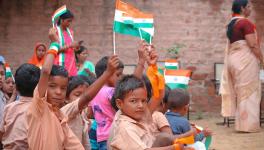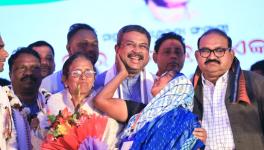Hindi as the Uniting Language of India?

Modi 2.0 has emerged as a very powerful government. It not only has numerical majority; it is also facing a weak and divided opposition. That is one of the reasons for it steam rolling over people’s opinions and imposing the Rashtriya Swayamsevak Sangh- Bharatiya Janata Party (RSS-BJP) agenda of Hindu nationalism in a blatant way. On one side, it has brought in a law banning triple talaq, on the other it has revoked Article 370. Encouraged by these easy successes, now it seems to be unfolding it’s other agendas one by one.
Speaking on the occasion of Hindi day, BJP President and Union Home Minister Amit Shah went on to speak his party’s mind on Hindi as the national language. Mr. Shah said, it was necessary to have one language which could represent India in the world and that Hindi was widely spoken and could be the language to keep India 'united'. “To preserve our ancient philosophy, our culture and the memory of our freedom struggle,…there is at least one language, Hindi, that the nation knows. If Hindi is taken out of our freedom struggle, the entire soul of the struggle is lost,” he said. To emphasise his point, he tweeted this, “I want to appeal to people to promote their native languages but also use Hindi to make the dream of Bapu and Sardar Patel of one language come true."
The intentions behind this statement were not hidden, though the language is very clever. The idea is to relegate English and regional languages to the margins and to give more prominence to Hindi all through. Sensing the intentions of Shah, many a leaders from South India, M K Stalin, Shashi Tharoor, Pinarayi Vijayan and Kamal Haasan have openly come against his statement. All of them see this as an attempt to impose Hindi on these states. Vijayan put it bluntly through his tweet, “That language (Hindi) is not the mother tongue of majority of Indians. The move to inflict Hindi upon them amounts to enslaving them.” While Kamal Haasan, in a video where he can be seen standing next to the Ashoka pillar and the Preamble, says India became a republic in 1950 with a promise to the people that their language and culture will be protected. “No Shah, Sultan or Samrat can suddenly break that promise. We respect all languages but our mother language will always be Tamil… The battle for our language will be exponentially bigger…,” he says.
Also read: ‘This is India, not Hindia’, DMK’s Stalin Hits Back at Amit Shah on ‘One Nation, One Language’
As such our country has been very diverse in all the matters related to language, culture, religion and ethnicity. The freedom movement was the real reflector of this diversity. People cutting across all these considerations stood as a single fraternity, respecting the diversity and the rich heritage coming from different religions and languages in particular. In all the languages, India’s aspirations of becoming a single nation got expressed. Hindi, along with other regional languages, has inherited a rich lineage for becoming the mirror of Indian society. Though English was introduced primarily as an administrative language, it soon became part of Indian culture, and all these also became a mirror of Indian society and aspirations.
In contrast to the national movement for freedom from British slavery, which stood to reflect all the languages, the communal forces had different ideas. Muslim communalism came up with the slogan, ‘Urdu, Muslim Pakistan’, and on parallel lines Hindu nationalism threw up the slogan, ‘Hindi, Hindu, and Hindustan’. When Pakistan was formed in the Muslim majority areas (East Pakistan and West Pakistan), their languages were very diverse. Muslim League’s insistence that Urdu should become the national language of Pakistan did precipitate the feeling of separation of East Pakistan from West Pakistan leading to the formation Bangladesh with Bengali as the major language.
Interestingly, the makers of Indian Constitution concluded that "Hindustani, written either in Devanagari or the Persian script at the option of the citizen, shall, as the national language, be the first official language of the Union. English shall be the second official language for such period as the Union may, by law, determine." The three language formula envisaged English, Hindi and regional language as the fulcrum of education. During the 1960s, there was an attempt to introduce Hindi in the southern states, and this led to massive protests all over, following which the policy was put on hold. Again, the New Education Policy under consideration wanted to make Hindi as mandatory. The argument continues that Hindi is the language of the majority of Indians. The latest data shows that it is the mother tongue of 25% of Indians and 44% people say they know Hindi. The massive opposition to this language part of the New Education Policy yet again led to holding back of Hindi as mandatory. One recalls that even during 1940s, when Congress government came to power in Tamil Nadu (Madras at that time), an attempt was made to introduce Hindi there. The resistance to this was articulated by Periyar Ramasamy Naicker, who raised the slogan ‘Tamil Nadu for Tamilians’ and accused Hindi of being a tool of the Aryans for infiltrating Dravidian culture.
How does one deal with the complex language issue. The country has been running well with English, Hindi and regional languages being used in different proportions at different levels. While there have been conscious efforts to spread Hindi to the southern states, there are no parallel steps to popularise regional languages in Hindi speaking states. One must say Hindi has definitely made long strides in spreading into southern and other states all over the country, but, this task has been achieved not by impositions from top but by the spread of Hindi films, and popular Hindi serials apart from the efforts of organisations promoting Hindi.
Also read: Proposal to Make Hindi Compulsory in UG Courses Can Affect Country’s Unity: CPI(M)
The issue of Urdu being the national language contributed to the split of Pakistan. In contrast, India has managed a remarkable balancing act in matters of languages so far. With Amit Shah unfolding their agenda of imposing homogeneity all over, one hopes present diversity, sentiments and aspirations of southern states will be given due weightage in deciding the national language policy.
Get the latest reports & analysis with people's perspective on Protests, movements & deep analytical videos, discussions of the current affairs in your Telegram app. Subscribe to NewsClick's Telegram channel & get Real-Time updates on stories, as they get published on our website.
























